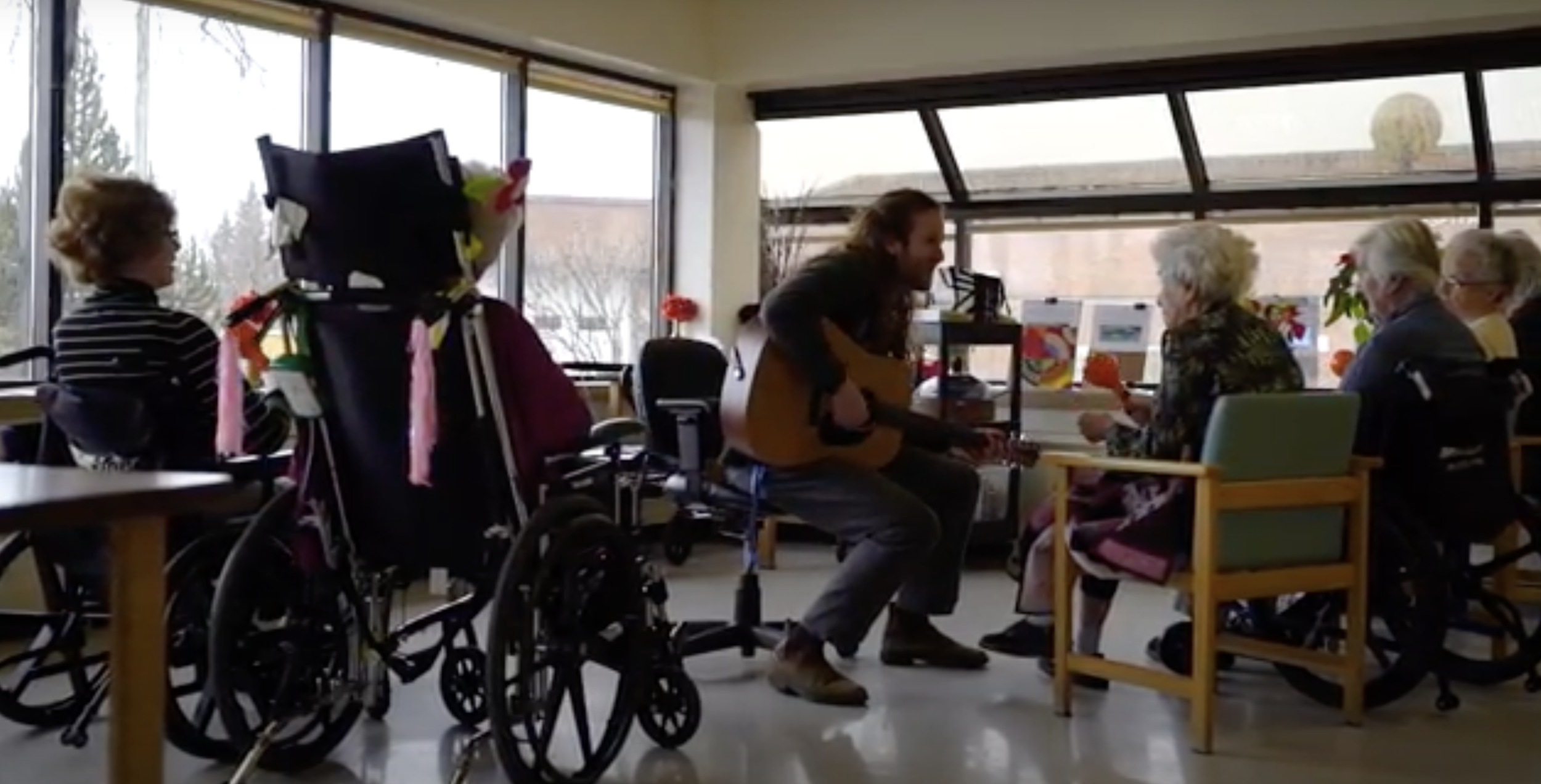Welcoming Joy & Nostalgia In The Form Of Music: A Big Thank You
The Canmore Hospital Foundation supports several incredible programs at the Canmore General Hospital through funding and spreading awareness. Among these programs is the newly named Crossway Music Therapy Program.
The Crossway Music Therapy Program is offered to Golden Eagle View Long-Term Care residents, individuals who live at the Canmore General Hospital full-time. Music is indescribably powerful; it brings people together, reaching beyond our differences in generation, culture, and geography to bond us in celebration and emotion. Music has the power to heal, uplift, and transport us to destinations in time, place, and feeling that we may otherwise be unable to access.
Led by Music Therapist, Andrei Dendridge-Evancio, Crossway Music Therapy program offered at Canmore General Hospital is incredibly beautiful. To paint a picture of the program itself and its profound impact on the hospital’s residents, we spoke with Adele Folliott, Recreation Therapist, and Katherine Sheel, Long Term Care Manager.
First and foremost, if you’re not familiar with Golden Eagle View, Katherine explained that the Long-Term Care unit is meant to support those who want to remain in their community as long as possible. While the Canmore Hospital’s Home Care unit helps support community members who want to stay in their homes and live as independently as they can, the Long-Term Care Unit comes into play when that’s no longer feasible. “At Golden Eagle View, we try to make the experience as much like home as possible,” said Katherine, “we received a generous donation from the Foundation to fully renovate the unit, the project was called ‘Feels Like Home’ and that’s really what the goal is here. We do our best to individualize the space and make it cozy with things like the fireplace and sitting area and we incorporate day-to-day things like music, recreation, and hobbies that the 23 residents enjoy.”
As Katherine mentioned, Golden Eagle View has 23 full-time residents. The resident’s range in age from 43 to 103 years old and people typically live there for around 4 years. Within the unit, there is an incredibly diverse range of lived experiences, backgrounds, and remarkable stories to tell. Music is a powerful tool for memory and nostalgia, and the Music Program demonstrates that.
Adele describes Andrei’s work with the residents. “A typical day for him involves coming in and doing some one-on-ones with some people and then a big group session with some of the higher functioning people. He utilizes different types of materials and tries to engage people individually, even in the group setting. It began with just one day per week but he was bumped up to two days which is even more awesome because he could spend a day doing one-on-ones with everyone and another day doing group sessions.”
As a Recreation Therapist, Adele works closely with Andrei, identifying everyone’s needs, strengths, and favourite genres of music. While the pandemic has shifted the program to virtual, for now, the goal is to get back to in-person sessions soon. Though, the virtual sessions have “been really good in different ways,” Adele shared, “we’ll bring the iPad into people’s rooms, close the door, and then they have the freedom to express themselves in ways they wouldn’t necessarily be comfortable within a group.”
The program caters to the needs and interests of each resident, particularly with the one-on-one sessions. “With one resident, there’s a lot of reminiscing about old times and old tunes, using music as an opportunity to reflect. They talk and bring it into song.” As another example, “We had one resident who really wanted to write a love song to her husband for Valentine’s Day, so they did that together and they played it for him. It was pretty special!”
Katherine explained that the in-person group sessions “involve things like maracas, tambourines, or scarves so that the residents are totally engaged in not just listening or singing along, but actually keeping the rhythm and being part of making the music.
Adele told us that even the staff members tend to sing along and dance to the music and “while it’s technically for the residents, it ripples through into the whole facility.”
The power of the Crossway Music Therapy Program is clear, and the residents absolutely love it. “It really allows residents to reminisce,” said Adele. “They get lost in the music and Andrei encourages them to participate and engage with it. We have a resident who’s not necessarily vocal anymore, but they’ve always loved to dance and so they all get to enjoy it in different ways. It really lifts their mood”
Adele describes the impact of the Crossway Music Program as “big and long-lasting. It extends itself throughout the day, as opposed to just in the moment, they just seem to be uplifted, and when I said ‘it’s Friday, it’s Andrei day!’ They can’t wait.” The residents can be seen smiling and laughing throughout the experience and it coaxes out their expressive side, allowing them to relive and retell the stories of their own lives and histories.
After learning about this wonderful program, it’s easy to see why it’s so important. The thing is, it’s not guaranteed. Programs like these are made possible through the generosity of our donors. While we are endlessly grateful for the support of our community, donations aren’t always consistent, and gaining predictable funding allows consistent programming into the foreseeable future.
Recently, the Canmore Hospital Foundation received full funding for the Music Program and renamed it the Crossway Music Therapy Program. This donation will ensure that the Foundation and the hospital can predictably offer this program for our residents. We would like to extend our gratitude to Crossway Community Thrift in Canmore for their immense generosity.
“Thanks to continued community support, Crossway Community Thrift has been giving back to charities and organizations in the Bow Valley for over 23 years,” said Crossway Chief Operating Officer Jennifer Cuell.
“We are proud to support the Canmore Hospital Foundation and the projects and programs that have provided value to the lives of many in the valley. The music program is another great way to give back to those who have supported us over the years. It encourages expression and creativity, as well as gives individuals an opportunity to connect with those around them. It is a wonderful way to brighten the day of both patients and caregivers.”
There are no words to properly describe the impact of this contribution. “We’re in a climate of health care cuts. When you look at health care overall, it isn’t a priority to have music,” said Katherine.
“The fact that we’ve received their generous donation and that the donor sees value in the program is something that changes and enhances Long Term Care as a whole. It makes it feel more like home. It’s not clinical, it’s a natural, normal environment that we would all have in our own homes and that we all tend to take for granted.”
Thank you, Crossway, for bringing music, nostalgia, joy, and community into Golden Eagle View, your contribution is truly invaluable.


